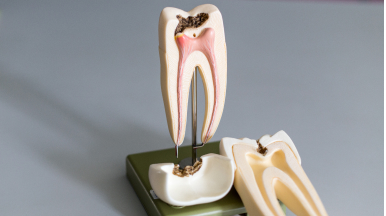
What Is Root Canal Therapy?
When cavities expose root pulp or root tissue deep within the tooth, infection can set in. Root canal therapy is an endodontic treatment that aims at clearing the infection and protecting the tooth from further infections. Although a tooth that needs a root canal does not always feel painful, common symptoms include:
- Sensitivity to hot and cold
- Sensitivity to air on the tooth
- Pain when chewing or biting down
- Severe toothache that wakes you up at night
- Red and swollen tissue adjacent to the tooth
- Dark discoloration of tooth
What To Expect
Treatment may involve more than one visit to properly restore the diseased tooth. At the initial visit, Dr. Gubler, Dr. Gorman, Dr. Hill or Dr. Waddell will remove the affected root tissue, clean the interior of the root, and apply a specialized medication, which promotes healing and reduces inflammation. If your tooth is an anterior (front) tooth, it will be sealed with a new filling. If it is a posterior (back or molar) tooth with no existing crown, our root canal dentist will recommend a crown to properly restore the tooth. If your tooth has an existing crown and is still healthy, it will be sealed with a filling. You may be asked to attend follow-up visits to ensure the success of your root canal.
What About Cracked Teeth Syndrome?
Sometimes, the unexpected can happen due to injury or as a result of stresses over time. This can cause teeth to fracture or develop craze lines, and patients who have this issue may experience teeth sensitivity. If this happens, we provide treatment to save the life of the tooth and use restorations, such as dental bonding, fillings or crowns, to repair your smile. If more advanced treatment is needed, endodontic options may provide a solution.
If you have a troublesome toothache and questions about root canal therapy in Rogers, Arkansas, call Lifetime Dental today at 479-631-9393.
